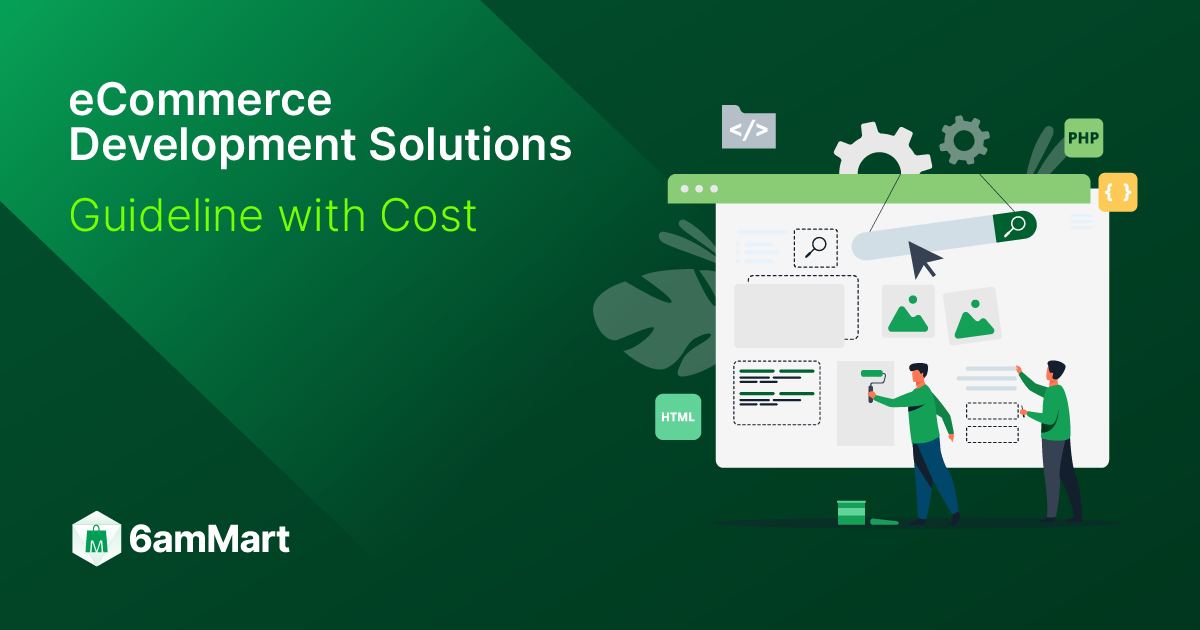Remember the pandemic period? An approximate number of 14,498 startups were recognized by the government in India alone during 2020!
Seeing all the success my neighbor also started her business back then that only survived for 3 years. The problem? Well, she was not getting the expected ROI as opposed to the eCommerce development solutions she chose and invested in.
If you want to avoid this kind of problem and start your entrepreneurial journey by putting your best foot forward as the first step – this blog is for you! I’ll discuss different types of eCommerce development solutions and their prices in this blog so you won’t have to hunt the internet alone to gather information.
So let’s get started.
Multiple Options for eCommerce Development Solutions
To build or develop your eCommerce store, you can opt for different options. Depending on your knowledge, budget, time, demand for features, and business size, you can choose between these options.
- Developing from scratch
- SaaS customization
- Open Source CMS
- Readymade solution
- MACH Architecture
Developing from Scratch
If you want complete customization and control over your website, you can build it from scratch. For this, the best option would be to build a team of experts.
Otherwise, you can seek freelance services on different platforms to develop your eCommerce website.
Additionally, you will have to consider choosing the best tech stack for your eCommerce business website. As the success or streamlined operation of your business mostly depends on this factor, it’s better to be safe than sorry while choosing.
Building a solution from scratch gives you the flexibility and power to make your online store as unique as possible. But remember, it also comes with the responsibility to maintain and monitor web hosting, security issues, updates, and technical expertise.
SaaS Customization
If you don’t want to take the hassle of coding from scratch and scratch your head due to budget constraints – you can look for SaaS eCommerce platforms.
Software as a Service (SaaS) platforms are cloud-based systems that provide pre-built eCommerce solutions. You can customize them to align with your business requirements. Many small business owners or startups find it ideal as it offers faster deployment and scalability. Popular SaaS eCommerce providers are Shopify, BigCommerce, Adobe Commerce, etc.
Going for a SaaS solution you won’t have to worry about maintenance, security & PCI compliance, and other technical aspects. That means, even with a limited technical knowledge you can run your eCommerce using a SaaS platform.
However, it comes with a lack of customization options and a need for advanced customizability. Also, these platforms charge a subscription fee for using their software.
Open Source CMS
With open source eCommerce CMS, you get the flexibility to customize and modify your website. Many developers collaborate to enhance and maintain these platforms. Generally, the platforms are free until you go for hosting, development, customization, integration, etc options.
If you want to take full advantage of open source options, you or your team need to be experts in web development. The platform itself is made to modify, so your expertise or your team’s expertise will determine how much you can implement customization based on your business requirements.
Also, as a user of open source platforms, you will have to keep an eye on updates, apply them, maintain PCI compliance, and monitor the security of the whole system.
However, these platforms can accommodate businesses of all sizes with a huge ecosystem of plugins, extensions, and integration options.
Popular open source CMS includes WooCommerce, OpenCart, Magento, etc.
Readymade solution
The readymade solutions come with launch-ready scripts that you can purchase from different online platforms. With these scripts, you get a full package of websites and apps for different users of the system or business.
So you won’t have to worry about developing or integrating apps or websites separately for your eCommerce business. It offers eCommerce payment processing solutions as they have third-party integration options within the system.
You will get personalized branding options with these scripts to tailor the platform to your business’ taste.
For example, 6amMart is a multivendor and multimodule eCommerce business solution with all the essential panels, websites, and mobile apps. This launch-ready solution offers multiple revenue streams and multiple vendor options to provide you with an industry-ready eCommerce solution. The best part is you get complete documentation to set up the system without any hassle. You can simplify your journey with this solution without having multiple contacts or platforms to handle.
MACH Architecture
The acronym stands for Microservices-based, API-first, Cloud-native, and Headless. It is a modern toolkit to build an online store.
With MACH, businesses can integrate different software solutions easily, scale up as needed, and bring new features to market faster.
- Microservices are individual applications that perform one task each. They’re easy to update and hold higher fault tolerance.
- APIs, or Application Programming Interfaces, are like messengers that allow different software applications to communicate with each other. With an API-first approach, the APIs are built first before any other action to preserve the original API.
- Cloud-native software is designed to run and scale efficiently in cloud environments. With its scalable architecture, all the technologies integrated with it update automatically.
- Headless setup is an approach that separates the front-end and back-end of an online store. This means that you can make changes to your website’s appearance without affecting the backend’s functionality. Ultimately, this leads to a better shopping experience for your customers.
By combining these solutions, you can create an eCommerce platform that is flexible, scalable, and agile.
How much do eCommerce development solutions cost?
In this section, the cost of eCommerce development solutions is divided into different parts. First, we will have a look at the costs based on different business sizes.
Whether you have a startup, mid-sized, or large business – the most crucial thing that you should consider is the cost.
Although the exact eCommerce website development cost depends on the complexity of the chosen platform, features, development team type, etc., I have shared an estimation of costs for different business sizes below. These values are here to give you an idea for developing an eCommerce solution. Just like every business is unique, its needs are unique too. So, the cost may vary from business to business.
| Business Size | Estimated cost |
| Small sized | US $2500 to US $25000 |
| Mid-sized | US $15000 to US $50000 + |
| Large enterprise | Above US $50000 + |
The costs of building your eCommerce website solutions may vary depending on the option you choose. If you build it from scratch, you should consider the costs of building a team or hiring manpower. Additionally, there will be maintenance and update costs that you will need to take care of from time to time.
If you go for a SaaS solution, consider the subscription fees, plugin, extension, SaaS app type, product complexity, and add-on fees. Moreover, if you want to customize with these platforms, you will have to shell out.
With readymade solutions, you will get all your required system – web panels, apps, and documentation by paying once. Some eCommerce development solutions offer installation, customization, and support services that you can avail of by spending a few more bucks.
Open source eCommerce platforms are free to use but additional costs may apply for hosting, development, customization, integration, and security compliance.
For a better understanding and estimation have a look at the table below:
| Development Options | Estimated Costs |
| Developing from Scratch | US $1500 to US $ 30,000 |
| SaaS Solutions | US $7000 to US $500000+ |
| Readymade Solutions | US $20 to US $100+ |
| OpenSource Platforms | US $5000 to US $50000 |
As each business’s requirements are unique and vary from each other, the cost of development teams also varies from region to region. For example, the ecommerce website development cost in India won’t be the same as in the USA. So based on the region we have given an estimated cost for outsourcing manpower to develop eCommerce:
| Region | Estimated Cost |
| USA | US $10,000 to US $250000 |
| UAE | US $1,361 to US $81000 + |
| India | US $723 to US $12,055 |
Remember these are all the ballpark views for different options. There’s no one-size-fits-all scene when it comes to eCommerce development costs. These estimations are here to give you an idea.
Final words
Now that you have a comprehensive idea of different eCommerce development solutions and how much it costs to develop one – I hope it has become easier for you to go for the right one for your business. Remember to keep the scalability, flexibility, and customization options in mind while choosing any solution, along with the costs.
Why? As your business grows, your platform needs to grow and adapt as well. For easy, convenient, and cost-effective solutions, you can rely on readymade platforms.
All right, see you in the next blog!
FAQs
How long does it take to develop an eCommerce website from scratch?
Depending on the complexity, features, and developers’ expertise it may from one week to a year.
Is it possible to switch eCommerce platforms in the future?
Yes, it is possible. However, the process is complex and might require help from developers or migration services. You’ll need to transfer your data, products, and settings to the new platform and ensure everything works smoothly before switching over. It’s important to plan carefully and choose a platform that meets your current and future needs to avoid having to switch too often.
What are the costs associated with eCommerce development solutions?
The costs associated with eCommerce development solutions can vary. Generally, you can expect to pay for things like website design and development, domain registration, hosting fees, payment processing fees, cyber security, marketing, shipping, platform fees, sourcing products, any third-party integrations or plugins, etc.
Meet Mehrin! A technical writer with a Computer Science background. She combines her academic knowledge & creativity to transform complex facts into engaging content. With a sharp eye for detail, she keeps readers updated on tech trends. Outside of writing, she’s a visual storyteller, capturing life’s moments through photography.







